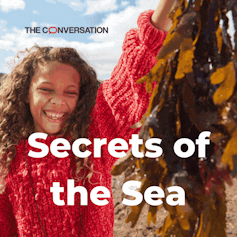Over the past 50 years, global aquaculture including fish, mussel and seaweed farms has grown dramatically. Almost half of the world’s wild-caught fish is used to produce fishmeal and oils that feed farmed fish.
Mussel farming provides a more sustainable alternative protein source for human diets, because mussels filter feed on plankton and do not have to be fed wild-caught fish. Mussel farming also takes some pressure off the need for so much industrial agriculture and fish farming, and could therefore help reduce greenhouse gas emissions of food production – in line with the UK’s goal to reach net zero by 2050.
Most mussel farms are typically located in sheltered bays but as space to grow mussels inshore is limited, there isn’t always room to grow mussels at scale.
Some coastal mussel farms can damage the environment as the mussel waste accumulates and can deplete oxygen in sediments, which in turn affects the animals that live in and on the seabed. As a result, offshore mussel farming (growing and harvesting mussels far from the coast) is becoming increasingly attractive.
In Lyme Bay on the south coast of England, the UK’s first offshore mussel farm has been in operation since 2013. This farm has a licensed area of 6 square miles (15.4km²) and is located 2-6 miles away from the coast. To grow the mussels, the farmers deploy long ropes that are anchored to the seabed and kept afloat using large buoys.

Local science, global stories. This article is part of a series, Secrets of the Sea, exploring how marine scientists are developing climate solutions. In collaboration with the BBC, Anna Turns travels around the West Country coastline to meet ocean experts making exciting discoveries beneath the waves.
Blue mussels (Mytilus edulis) naturally settle on these ropes. Hands-on input is minimal – the farmers need only distribute small mussels around the farm so they have space to naturally grow to the desired size, before they are harvested after 12-to-18 months. This farm is now producing more than 2,000 tonnes of high-quality, rope-grown mussels in a fully offshore marine environment.
The Lyme Bay mussel farm, managed by family-run company Offshore Shellfish Ltd, was the first in Europe to be certified for best aquaculture practices by the Global Aquaculture Alliance. Its infrastructure creates physical habitat for marine species such as fish and crabs to feed, breed and shelter. The rope farm structure also prevents destructive fishing such as trawling and dredging in the area.
Our team of marine researchers have been monitoring marine life in and around this mussel farm since before the first ropes were deployed in 2013 – with the help of the local fishing community. We use their boats as research vessels to monitor how the farm’s biodiversity has changed in the past decade.
We use a range of non-destructive, remote underwater video cameras and more traditional sampling techniques to count animals that live on the mussel ropes, on the seabed and in the water column inside the farm, as well as at reference sites to the east and west of the farm.
Before the first ropes were deployed, the habitat had been degraded from years of destructive fishing, so our early observations didn’t detect much marine life. That has changed over the life of the farm, and we now see significantly increased productivity and greater biodiversity.
Over many years, our studies have shown how some mussels from the farm have fallen to the seabed and regenerated lost shell reefs. The farm has also boosted populations of crabs, lobsters, scallops, starfish, fish, conger eels, sharks and rays.
Our team’s Defra-funded Ropes to Reefs project builds on this annual monitoring to help us understand the potential conservation benefits of the mussel farm. We are also studying how the farm affects the nearby Lyme Bay marine protected area, and recording any “spillover effect” as commercial fish breeding within the farm move out into local fishing grounds.
We use cutting-edge technology such as acoustic telemetry and an echosounder to tag and track lobsters, thornback rays and small-spotted catsharks, and measure the total amount of fish to better understand why and when species use the farm.
This new data will enable us to calculate the full value of the Lyme Bay mussel farm to species of both conservation and commercial importance. Our findings to date show that offshore aquaculture farms like this can have positive effects on the surrounding marine ecosystem.
By creating structure and excluding the damaging effects of bottom-towed fishing, offshore mussel farms can restore degraded fishing grounds and provide a sustainable and healthy source of marine protein.
As demand for mussels increases, offshore mussel farming and other types of shellfish farming can help improve the UK’s food security and economic resilience, and enhance its seafood industry, while contributing to marine conservation and net zero goals.
Listen to episode three of Secrets of the Sea here on BBC Sounds, presented by Anna Turns for The Conversation.
Don’t have time to read about climate change as much as you’d like?
Get a weekly roundup in your inbox instead. Every Wednesday, The Conversation’s environment editor writes Imagine, a short email that goes a little deeper into just one climate issue. Join the 45,000+ readers who’ve subscribed so far.
Emma Sheehan receives funding from DEFRA, European Commission and Offshore Shellfish Ltd. Funders are not involved in research design or interpretation.
Llucia Mascorda-Cabre receives funding from Defra.
This article was originally published on The Conversation. Read the original article.







